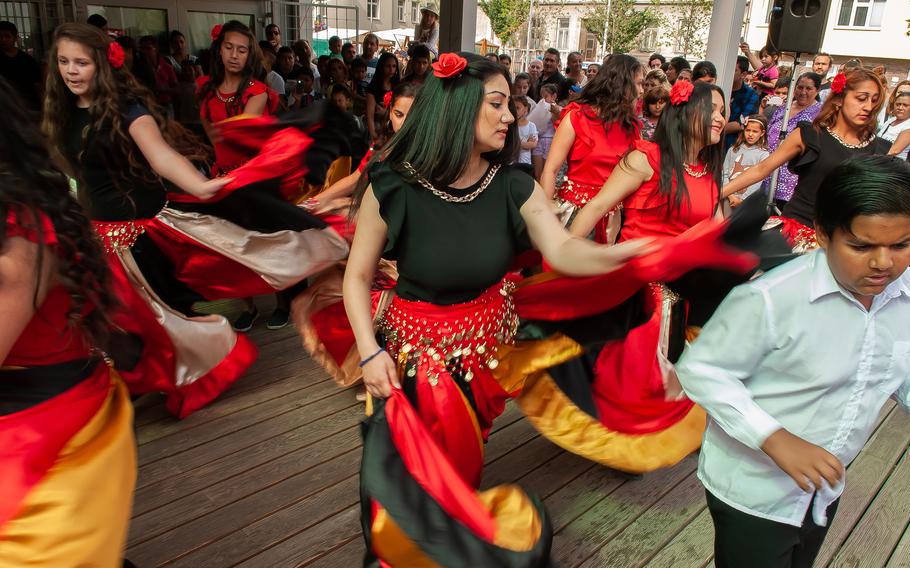
Romani culture will be celebrated May 26-June 1 at the Khamoro Festival in the Czech Republic capital of Prague. (iStock)
French, Spanish, German or Italian — it’s pretty easy to name off some of Europe’s largest nationalities. Among these well-known population groups reside dozens of ethnic groups with equally rich cultures and traditions just waiting to be discovered and celebrated. Here are some events and activities at which to get to know the minorities of Europe:
Prague, Czech Republic: The Khamoro Festival, slated for May 26-June 1, shines a light on Romani culture through music, movie screenings, exhibitions and participatory activities. The festival first launched in 1999 bills itself as the biggest Romani festival in the world. Attendees can enjoy traditional Romani music, Gypsy jazz and classical performances. Other features of the festival whose name means “sun” in Romani include a day for children and a parade through Prague’s city center. Online: khamoro.cz/en
Just days later, other minorities residing in the Czech Republic are feted at the annual Heart of Nations Festival. From May 30-June 2, the 26th edition of this event will showcase traditional folk arts in the form of music, dance, traditional clothing, exhibitions and handicrafts. Much of the festivities take place against the beautiful backdrop of Prague’s Old Town. The highlight event, the gala concert, will be held June 2 at the Vinohrady Theater at 7 p.m. Online: prahasrdcenarodu.cz
Manndalen, Norway: The Riddu Riđđu Festival is an international Indigenous festival set in a small community located a two-hour drive east from the city of Tromsø. For more than 30 years, Riddu Riđđu has strived to increase awareness and pride in the Sámi, a northern people inhabiting the region of Sápmi, whose traditional lands stretched over the northern reaches of what’s now Norway, Sweden and Finland, as well as Russia’s Kola Peninsula. This summer festival, open-air and family-friendly, offers free camping to all who make the trek there. Things to do here might include enjoying a concert by performers of indigenous backgrounds such as a rock band out of Greenland or participating in workshops to learn the art of tin thread embroidery or a few words in the Kildin Sámi language. Movie screenings, an on-site crafts market and children’s activity area are also among the offerings. Each year, a different Indigenous people are named Northern People of the Year; in 2024, the Lakota people are given a platform to share their cultural expressions including drumming, singing and dancing. Some parts of the program, such as workshops, require advance registration. A festival pass for the duration of the festival, July 10-14, goes for 1900 Norwegian Krone, about $174. Youth, family, single-day and other types of tickets are also on offer. Online: riddu.no/en
Germany and Denmark: From June 14-July 14, millions of fans will root for their countries’ successes as their national teams take part in the 2024 UEFA European Football Championship, a series of men’s soccer games to be played out in venues across host nation Germany. At roughly the same time, the European Football Championship of the autochthonous national minorities (EUROPEADA) 2024 will determine the newest European Minority Football Champions. The tournament, now in its 5th edition, features 36 teams from national and ethnic minorities from 15 European countries, including 27 men’s and 9 women’s teams. The group phase runs from June 30-July 2 and is followed by the knockout round and placement matches July 4-6. In addition to the festive opening ceremony and the finals, a cultural day in the middle of the tournament gives the participating minorities the chance to present their cultures, languages and traditions to one other. EUROPEADA 2024 will be hosted by the Sinti and Roma and the Frisian minority in the German state of Schleswig-Holstein, the German minority in Denmark and the Danish minority in Germany and play out across 14 locations in both countries. The tournament is organized by the Federal Union of European Nationalities, or FUEN. Online: europeada.eu/de
Basque Country, Spain: During the first week of September each year, Basque provinces organize weeklong events dedicated to their culture. During the week known as Euskal Jaiak, people compete in sporting events, perform Basque songs and dances and attend fairs. Sampling the local cuisine also figures prominently in the happenings. The city of San Sebastián, which stages its annual rowing regatta, sea swimming competitions and matches of its traditional sport of Pelota Vasca, would make a fun base at this time of the year. The festivities are scheduled for Aug. 28-Sept. 8. Online: tinyurl.com/4kn5euu8
Workum, Netherlands: In late autumn, this city of 4,500 in the province of Friesland hosts a week of festivities related to the area’s fishing and agricultural heritage. Friesland is an area inhabited by a Germanic ethnic group called Frisians who are indigenous to the coastal parts of the Netherlands and northwest Germany. Four distinct events make up the so-called Stronkweek, literally “Shit Week”: the navigation of passenger boats and ferries to ports of call along the coast, fishing for pike-perch from traditional watercraft; the Liereliet music festival of sea shanty singing, and a race between manure-filled barges, a nod to the time when the area’s dung played an important role in fertilizing Holland’s fields of flower bulbs. The festival takes place Oct. 25-Nov. 2. Online: immaterieelerfgoed.nl/en/strontweek